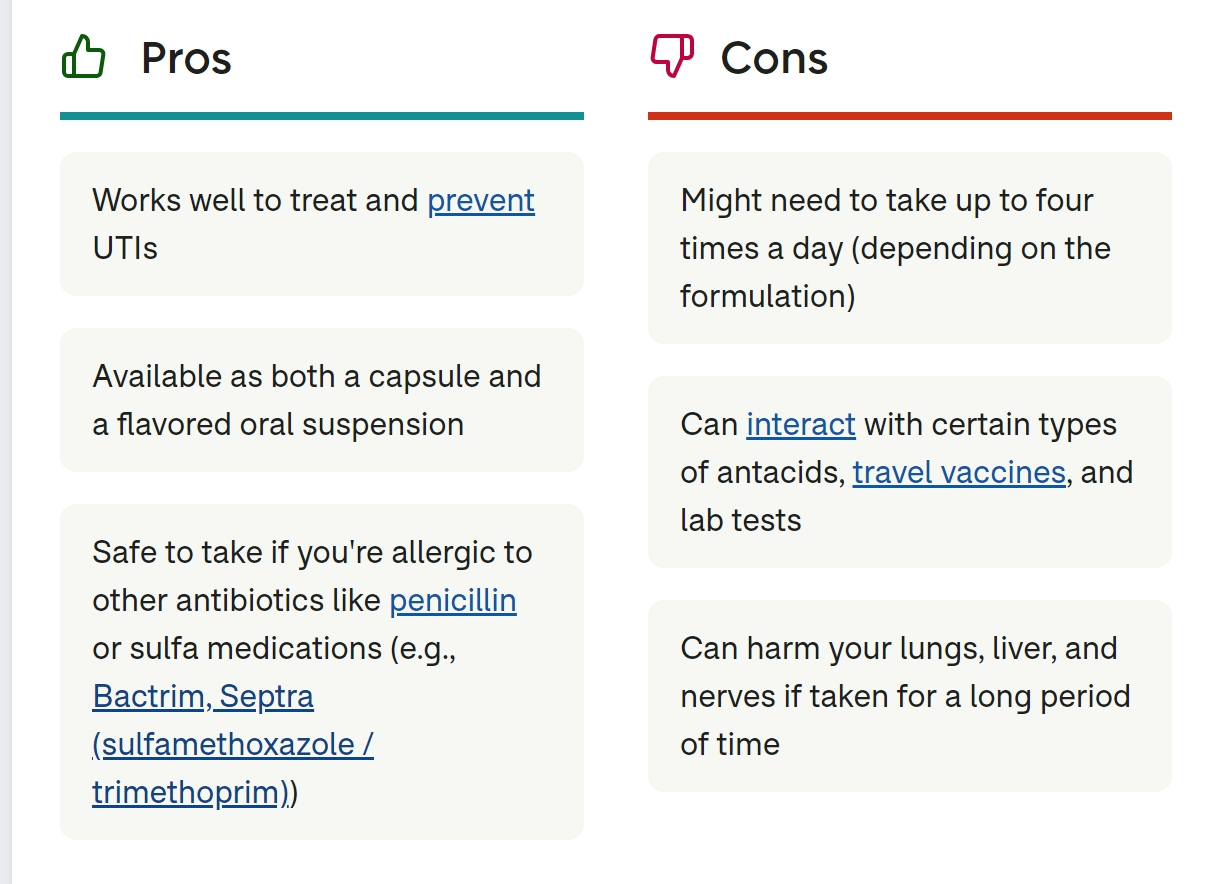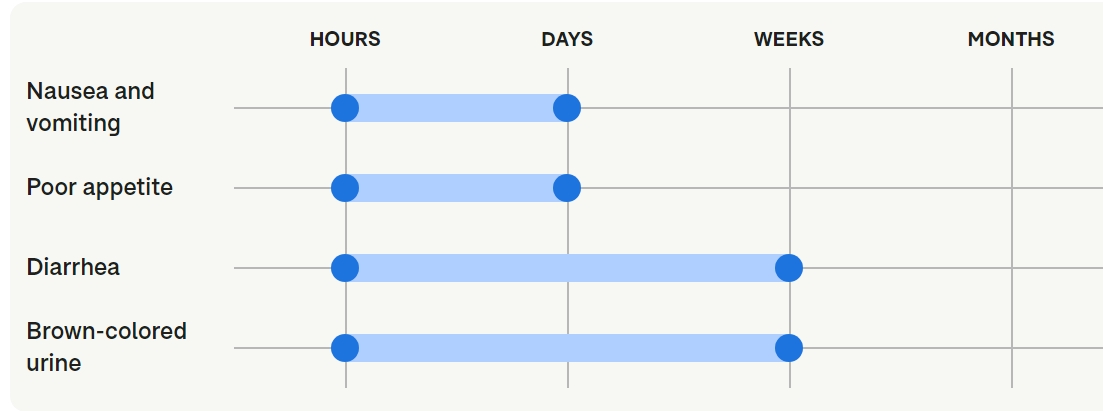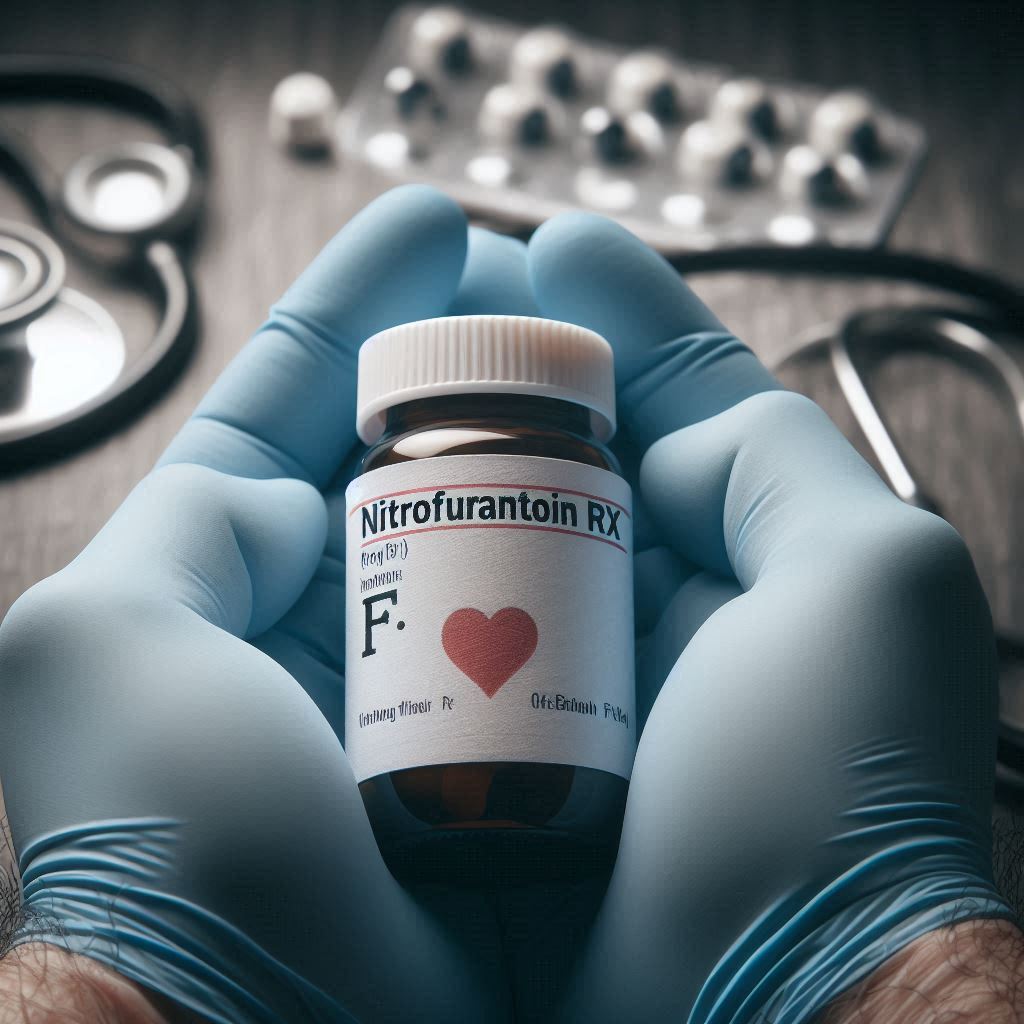Overview
Nitrofurantoin, marketed under the brand name Macrobid, is an antibiotic prescribed for the treatment or prevention of urinary tract infections (UTIs). Common side effects of this medication may include nausea, headaches, and flatulence. Additionally, it has the potential to alter the color of urine, causing it to appear dark yellow or brown. Nitrofurantoin has minimal interactions with other drugs, making it a suitable option for many patients. For those seeking a more affordable alternative, a generic version of Nitrofurantoin is also available.
What is Nitrofurantoin (Macrobid) used for?
- Treatment or prevention of urinary tract infections
How Nitrofurantoin (Macrobid) works
Nitrofurantoin (Macrobid) is a nitrofuran antibiotic. The medication collects in your urine. It kills bacteria in the urinary tract by damaging or blocking proteins the bacteria need to survive.
When does Nitrofurantoin (Macrobid) start working?
Time passed since treatment started:

- Finish all of the nitrofurantoin (Macrobid) your healthcare provider prescribed for you, even if you start to feel better. Stopping the antibiotic too soon can cause your infection to come back and be harder to treat.
- Take nitrofurantoin (Macrobid) with food. This helps your body absorb the medication properly and lessen stomach-related side effects.
- Nitrofurantoin (Macrobid) can turn your urine a dark yellow or brown color. This is harmless and will disappear when you stop the medication.
- If you have mild diarrhea after taking nitrofurantoin (Macrobid), remember to drink plenty of fluids to prevent dehydration. You can also try taking probiotic supplements to help lessen this side effect. Separate the probiotic from nitrofurantoin (Macrobid) by at least 2 hours. This prevents the antibiotic from killing the "good" bacteria found in the probiotic and allows the probiotic to work as it should.
- Avoid taking nitrofurantoin (Macrobid) at the same time as any antacids, supplements, or multivitamins containing magnesium. These products can prevent your body from absorbing the antibiotic well.
- For the liquid form: Shake the bottle well before using it. Be sure to use a medication dose cup, spoon, or oral syringe to measure out your dose. Using household teaspoons might cause you or your child to take the wrong amount of nitrofurantoin (Macrobid).
- If you're pregnant, make sure your provider knows your due date. Nitrofurantoin (Macrobid) might harm your unborn baby if it's taken within the last 2 to 4 weeks of your pregnancy.
- If you're breastfeeding a baby who's younger than 1 month of age, speak with your provider about the risks and benefits of taking nitrofurantoin (Macrobid). There's a potential risk that the medication can cause harm to your baby.
What are the risks and warnings for Nitrofurantoin (Macrobid)?
Nitrofurantoin (Macrobid) can cause some serious health issues. This risk may be even higher for certain groups. If this worries you, talk to your doctor or pharmacist about other options.
Lung damage
- Risk factors: Using nitrofurantoin (Macrobid) for 6 months or longer
In some rare cases, nitrofurantoin (Macrobid) can damage your lungs. Your risk is higher if you're taking this medication for more than 6 months. Talk to your healthcare provider as soon as possible if you're having difficulty breathing or have a new cough that doesn't go away.
Liver damage
- Risk factors: History of liver problems
Very rarely, some people taking nitrofurantoin (Macrobid) have had severe or life-threatening liver damage. Your risk might be higher if you have or have had liver problems. If you experience unexplained stomach pain, nausea, vomiting, dark urine, pale stools, or yellowing of your skin or whites of your eyes, contact your healthcare provider right away. You'll likely need to get blood tests done so your provider can check your liver health.
Nerve damage (neuropathy)
- Risk factors: Kidney problems | Low number of red blood cells (anemia) | Low vitamin B levels | Electrolyte imbalances | High blood sugar (diabetes)
Nitrofurantoin (Macrobid) can damage the nerves in your arms, legs, and rarely eyes. This effect isn't very common, but certain medical conditions, including kidney problems, can raise your risk of this happening. In some cases, the damage is permanent. Tell your healthcare provider if you experience numbness, tingling, or a prickling sensation in any part of your body while using this medication. If you're taking nitrofurantoin (Macrobid) for a long period of time, you'll likely need to get blood tests done regularly so your provider can check your kidney function and risk of nerve damage.
Breakdown of red blood cells (hemolytic anemia)
- Risk factors: G6PD deficiency | Black people | People of Mediterranean or Middle Eastern ethnicity
Nitrofurantoin (Macrobid) can damage your red blood cells and cause hemolytic anemia. Your risk is higher if you're lacking a specific protein in your body called glucose-6-phosphate dehydrogenase (G6PD). Black people and those of Mediterranean or Middle Eastern ethnicity are more likely to have this deficiency. Tell your healthcare provider about the medical conditions you have before starting this antibiotic. Let your provider know if you feel unexplainably weak, dizzy, or tired while taking nitrofurantoin (Macrobid).
Severe diarrhea
- Risk factors: Use of multiple antibiotics | Long-term use of antibiotics | 65 years or older | Recent hospital stay | People with a weakened immune system | Previous infection from or known exposure to Clostridioides difficile
Like all antibiotics, nitrofurantoin (Macrobid) can cause diarrhea. This is because nitrofurantoin (Macrobid) can change the amount of "good" bacteria that's normally in your gut, which affects how well they keep dangerous bacteria away. In rare cases, this diarrhea is caused by an overgrowth of bacteria called Clostridioides difficile (commonly called C. diff). C. diff-related diarrhea is very contagious and can lead to life-threatening dehydration. If you experience watery or bloody stools, stomach cramps, or fever, contact your provider right away. If you have C. diff, be sure to wash your hands with soap for 20 seconds often, and try to use a different bathroom from anyone living with you until you're better.
Strengths
Capsule
- 25mg
- 50mg
- 100mg
Ml of oral suspension
- 25mg/5ml
- 50mg/5ml
Dosages
Treatment of UTI
- Macrobid capsules and its generics: For people over 12 years old, the typical dose is 100 mg by mouth every 12 hours with food for 7 days.
- Macrodantin capsules, Furadantin oral suspension, and their generics: For adults, the typical dose is 50 mg to 100 mg by mouth four times a day with food. For children ages 1 month and older, the dose will depend on their body weight; it's typically taken as 1.25 mg/kg to 1.75 mg/kg by mouth four times a day with food. This medication is typically taken for 7 days or for at least 3 days after you have a urine test that shows it's free of bacteria.
Prevention of UTI
- Macrodantin capsules, Furadantin oral suspension, and their generics: For adults, the typical dose is 50 mg to 100 mg by mouth once a day at bedtime with food. For children ages 1 month and older, the dose will depend on their body weight; it's typically 1 mg/kg of body weight by mouth per day with food.
Read Related Articles
Interactions
Nitrofurantoin (Macrobid) may interact with certain medications or supplements. Always let your doctor and pharmacist know about any other medications or supplements (including prescribed and over-the-counter medications, vitamins, and dietary or herbal supplements) that you are currently taking. The list below does not include all possible drug interactions with Nitrofurantoin (Macrobid). Please note that only the generic name of each medication is listed below.
Using this medicine with any of the following medicines is usually not recommended, but may be required in some cases. If both medicines are prescribed together, your doctor may change the dose or how often you use one or both of the medicines.
- Cholera Vaccine, Live
- Fluconazole
Nitrofurantoin (Macrobid) contraindications
Contraindications are specific health conditions or situations in which a person should not take a medication due to safety concerns. If you have any of the following conditions or if any of the following apply to you, let your healthcare provider know because Nitrofurantoin (Macrobid) will not be safe for you to take.
- History of liver damage or jaundice linked with nitrofurantoin use
- Severe kidney problems
- Urinating less than usual or not at all
- Females at 38 to 42 weeks of a pregnancy and during labor and delivery
- Children under 1 month of age
Side-effects
The following side effects may get better over time as your body gets used to the medication. Let your healthcare provider know immediately if you continue to experience these symptoms or if they worsen over time.
Common Side Effects
- Nausea (8%)
- Headache (6%)
- Gas (2%)
Other Side Effects
- Diarrhea
- Vomiting
- Upset stomach
- Stomach pain
- Dizziness
- Drowsiness
- Itchiness
- Fever
- Chills
- "Pins and needles" feeling in the arms and legs
Serious Side Effects
Contact your healthcare provider immediately if you experience any of the following.
- Severe allergic reaction: hives, rash, muscle aches, chills, fever, swelling of the lips or tongue, difficulty breathing
- Severe diarrhea
- Trouble breathing or new or worsening cough
- Liver problems: stomach bloating, severe stomach pain with vomiting, yellowing of your skin or the whites of your eyes, dark urine
When do Nitrofurantoin (Macrobid) possible side effects begin and end?
Time passed since treatment started:
The following side effects have also been reported
Along with its needed effects, a medicine may cause some unwanted effects. Although not all of these side effects may occur, if they do occur they may need medical attention.
Check with your doctor immediately if any of the following side effects occur:
More common
- Changes in facial skin color
- Chest pain
- Chills
- Cough
- Fever
- General feeling of discomfort or illness
- Hives
- Hoarseness
- Itching
- Joint or muscle pain
- Shortness of breath
- Skin rash
- Sudden trouble in swallowing or breathing
- Swelling of the face, mouth, hands, or feet
- Troubled breathing
Less common
- Black, tarry stools
- Blood in the urine or stools
- Burning, numbness, tingling, or painful sensations
- Dizziness
- Drowsiness
- Headache
- Pinpoint red spots on the skin
- Sore throat
- Unsteadiness or awkwardness
- Unusual bleeding or bruising
- Unusual tiredness or weakness
- Weakness in the arms, hands, legs, or feet
Rare
- Abdominal or stomach pain
- Blindness
- Blistering, peeling, or loosening of the skin and mucous membranes
- Blue-yellow color blindness
- Bluish color of the fingernails, lips, skin, palms, or nail beds
- Blurred vision or loss of vision, with or without eye pain
- Bulging soft spot on the head of an infant
- Change in the ability to see colors, especially blue or yellow
- Confusion
- Cracks in the skin
- Darkening of the urine
- Decreased vision
- Diarrhea
- Diarrhea, watery and severe, which may also be bloody
- Eye pain
- General tiredness and weakness
- Light-colored stools
- Loss of appetite
- Loss of heat from the body
- Mental depression
- Mood or mental changes
- Nausea or vomiting
- Pale skin
- Pale stools
- Red skin lesions, often with a purple center
- Red, irritated eyes
- Red, swollen skin
- Red, thickened, or scaly skin
- Skin rash
- Sores, ulcers, or white spots on the lips or in the mouth
- Swollen or painful glands
- Tenderness of salivary glands
- Unpleasant breath odor
- Upper right abdominal pain
- Visual changes
- Vomiting of blood
- Wheezing or tightness in the chest
- Yellow eyes or skin
Some side effects may occur that usually do not need medical attention. These side effects may go away during treatment as your body adjusts to the medicine. Also, your health care professional may be able to tell you about ways to prevent or reduce some of these side effects. Check with your health care professional if any of the following side effects continue or are bothersome or if you have any questions about them:
More common
Incidence not known
- Dizziness or lightheadedness
- Feeling of constant movement of self or surroundings
- Lack or loss of strength
- Loss of hair, temporary
- Sensation of spinning
- Uncontrolled eye movements
Common Concerns
Feedback from Our Clients
Explore feedbacks from our clients below. They reflect the dedication and expertise we bring to every interaction, and how our services have positively impacted their health.

